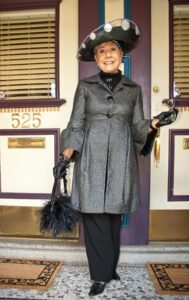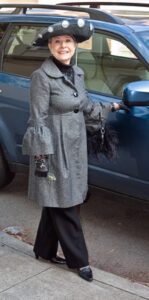Be a Star: 8 Tips to Make the Most of Your TV Appearance
Susan Harrow gives advice on making the most of TV appearances. This is a real life example of Mark Davis. He is an amazing young man and friend from San Francisco I met through Toastmasters.
“The Escape production crew interviewed me the afternoon of Friday June 8 at the Bay Club and shot some “B-roll” footage of me training clients. The actual race was on Sunday June 10 with an approximate start time of 8 am. I finished by 12 noon.
*SUSAN’S NOTE: “B-roll” means background shots to be used when the story is edited to illustrate the commentary and give “backstory” to bring the audience quickly up to speed to the present on-screen story.*
1. Make Sure Your Story Has “Human Interest”
To my shock and surprise, there were only two “human interest” stories, thus I had a better chance of getting more air time. Contrary to prior broadcasts, they followed me through the whole course with interview questions!!! (This is after spending 3 hours with them on Friday before the race).
*SUSAN’S NOTE: Any kind of dramatic visible change is ripe for TV coverage. Change that can be seen instantly (in this instance going from fat to fit) is easily understood visually. And it’s a success story anyone who has battled even a few pounds is interested in).*
2. Bring or Wear Your Props
Also, at the finish line they took an extreme close-up of the wording I had plastered all over my T-Shirt. I then said: ‘Let me explain what this website is all about,’ and told the signature story of my own weight loss.
*SUSAN’S NOTE: Very smart move. Wearing a curiosity provoking prop gives a natural segue to talking about the points you want to cover.*
3. Always Video and Audio Tape Your TV Appearances and Speaking Engagements
The day after the race, I got an urgent call from the New York TV producers. I had mentioned that I do motivational speaking during the interview. Did I have anything on tape? I did a 40 minute keynote pep talk to a rookie triathlon group the night before the Friday interviews and taped it anticipating such a request. However I did not feel it was my best effort as I was stressed and tired from all of the race/media/baby walking duties. I told the producer this and the exact reply was: ‘Don’t worry Mark; we will only make you look great!’
*SUSAN’S NOTE: Other producers want to see how you and your stories translate on TV. They are looking for raw talent, not someone slick and polished. In fact, they want someone just the opposite–someone who has verve and speaks spontaneously in a way that anyone can understand.
By the way, one of the complaints about the last group of contestants on the hit show “Survivor,” was that they were “too media savvy” which really meant too careful and guarded. That is not to say you shouldn’t practice your sound bites and know your message; it means that you need to preserve your own honest emotions and expressions. Be genuine.
An Aside: Another reason to tape all your appearances and speaking engagements is if your audio/video tapes are good enough you can later sell them as products on your website, and at your next speaking engagement.*
4. Act In A Heartfelt Way And You Will Be Automatically Compelling
As for the race itself, I got very sick throughout the course and struggled. This added to the drama: Will Mark be able to finish? I did finish strong and did a Lance Armstrong (The cyclist who recovered from cancer and competed in the 2000 Tour de France). When I was being interviewed by NBC at the finish line I ran over and kissed and hugged my wife and took Sterling (my daughter) and held her up and kissed her and said: ‘This is my real reward’ and ‘My dad was an Ironman for me and now I hope to be an Ironman for my daughter.’ Of course, I was operating on heartfelt emotion throughout the interviews. I would have done what I did camera or no camera. However, it made for a great scene and sound bite and I got to close out the show.
*SUSAN’S NOTE: Adversity creates tension and drama. In addition, the audience connected to Mark because they all understand what it’s like to do something for a loved one — especially a small child. A heartfelt message with strong emotion increases your chance of extra media coverage.*
5. Embrace the Opportunities That Present Themselves
A woman from Los Angeles who saw me on NBC is flying herself and her sister up to San Francisco to train with me. These sessions will pay for a good portion of the website. Other people from around the country are contacting me about e-training (which I may or may not do). A guy from a video production company saw me and we are talking about a video.
*SUSAN’S NOTE: All kinds of things can happen that you could never predict when you begin to do publicity. That’s part of the richness that makes PR so exciting E-training for working out? Who would have thought?*
6. Prepare to Make The Most Of The Results Of Publicity
Before the show I rushed to get a website up that offers a subscribe/unsubscribe to my “Weekly Enlightenment” e-zine and archives. I plan on using this to market my book and provide media information. My project manager tells me that 22% of visitors to my site opt to subscribe. A high benchmark “opt in” subscribe rate is 4%. No one has unsubscribed. As a matter of fact my e-zine encourages people to forward the e-zine and subscribe others. The word of mouth and the speed of the Internet will spread my message faster than the sound of a mouse-click. The best part is this site will be ready for when I do Hawaii Ironman, Oprah and Cristina (the Spanish language equivalent of Oprah. I am very fluent in Spanish and my Univision contact is working on this, after I provided the idea!).
*SUSAN’S NOTE: Make sure you’ve tested everything on your site thoroughly so it can handle a rush of visitors without crashing. You don’t want to lose all the connections you can make from your publicity because of some technical snafu.*
7. Do Anything You Can To Help The Producers Do A Great Show
All told, I ended up with a few seconds shy of 4 minutes of NBC national airtime, more than anybody on the show including the winners of the race and NFL quarterback Doug ‘I can’t swim’ Flutie (the media people told me he wasn’t being as cooperative as they would like; I probably looked like a saint compared to him and I am sure that helped). More people will continue to see the broadcast through videotape. And I now have a professionally produced, very compelling story about me that I can send to many other PR outlets. I have already contacted NBC about permission to use the video on my website.
*SUSAN’S NOTE: It goes without saying that you will be gracious and accommodating. Volunteer to do anything extra you can to help out and you will be remembered. Then send out that video tape ASAP to the shows you want to be on next — and remember to present a new and different angle. Every producer wants his show to be the first of its kind, not a copycat of a competitor’s.*
8. Work All the Angles
I am already anticipating my next steps: getting sponsors, leveraging the tape to get into Hawaii Ironman (even bigger TV audience) and of course Oprah. By that time I will have a book ready.
I am very confident this will all happen! It has taken me 5 years but all of the Toastmasters training (I co-founded a Bay Club chapter with Patricia Fripp), the classes such as yours, and the never say die attitude are paying off. It is like striking oil…long time drilling and then suddenly a gusher!
If you are a Toastmaster on not your can benefit from World Champions Edge. A speech coaching and public speaking training community. http://www.worldchampionsedge.com/
The coaching Champs are Ed Tate, Darren LaCroix, Mark Brown, Craig Valentine and their "plus one" Patricia Fripp. First month $1 to see the value. After that only $29.95 and many benefits.
*SUSAN’S NOTE: I couldn’t have said it better myself. Wishing you all a Yosemite sized gusher.*
*Thank you to Mark C. Davis, xBigman.com, for sharing his story that illustrates the use of my tips.*
Copyright (c) 2006 by Susan Harrow. All rights reserved.
Good media leads to speaking engagements. If you need to learn how to prepare or present a speech contact Patricia Fripp.
Read More...


